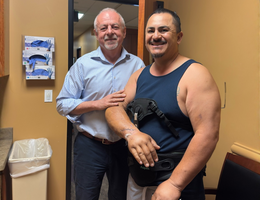

Knee and hip pain doesn’t always mean you need surgery. Many experience joint pain and seek help from their primary care doctors but may be intimidated by the idea of surgery. Asking to consult with an orthopaedic surgeon can broaden treatment options and provide honest feedback if it’s time for an operation.
Studies show total knee replacements are one of the most successful procedures in all of medicine with nearly 800,000 performed annually in the United States. Though they prove successful, the right surgeons will help you explore other options before pursuing surgery, says Tyler Roberts, MD, orthopaedic surgeon at Loma Linda University Health.
“I’m not going to recommend surgery to someone only to perform a procedure. I want all my patients to do and feel incredible. For some, there are ways to get there outside of surgery,” Roberts says.
A patient consulting Roberts about nonoperative options can expect an honest conversation about weight loss, medications, injections, and if surgery is needed.
Roberts says anti-inflammatories and injections provide temporary pain relief until a patient’s lifestyle and schedule are prepared for surgery and recovery. He says implementing a walking program can affect one’s pain because strong muscles help compensate for various problems in the joint.
These options are available for those who seek help early in experiencing pain. Roberts will not recommend nonsurgical measures to those with extreme damage.
“Building a relationship with your surgeon through this process allows us to fully understand the state of your pain and condition. You can consult with a specialist and not receive an operation date but a plan to relieve pain until surgery is necessary,” Roberts says.
Nonoperative options are great, but many times surgery is eventually needed.
Signs you need surgery:
- Everyday movements like walking and bending are debilitating
- Pain remains even when resting or it keeps you from sleeping
- You’ve explored nonoperative options and aren’t seeing an increase in quality of life
If you or a loved one are experiencing joint pain, stiffness, or limited mobility, ask your primary care doctor for a referral to an orthopaedic surgeon who can help you understand the best options for you.


